#teleology
Text

All the problems of metaphysics can be reduced to the proposition “There’s a lot of shit that we will never know.” -- Michael Lipsey
107 notes
·
View notes
Text
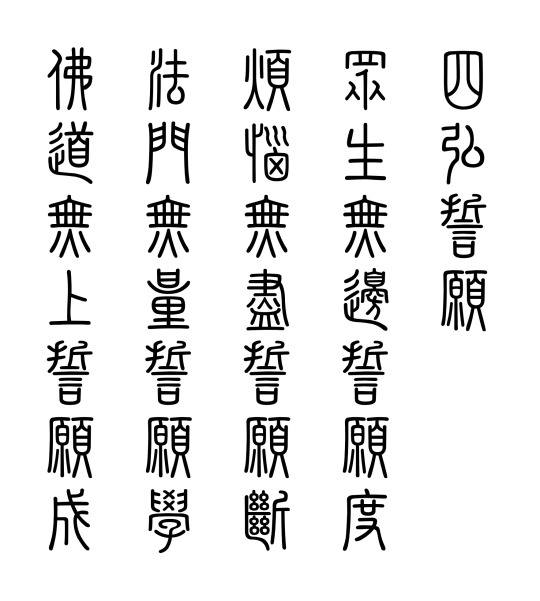
The Four Encompassing Vows
Masses of creatures, without bounds, I vow to save.
Anxiety and hate, delusive desires inexhaustible, I vow to break.
Dharma gates beyond measure, I vow to learn.
Buddha’s Way, unsurpassable, I vow to accomplish.
#bodhisattva#buddhism#mahayana#buddha#dharma#salvation#eschatology#teleology#nirvana#four noble truths#chinese#kanji#seal script
45 notes
·
View notes
Text

52 notes
·
View notes
Text
I swear to God, why are there so many teleological arguments?! 😭
#philosophy#pain#revision#exam season#teleology#thomas aquinas#Richard Swinburne#F R Tennant#i want to disappear
17 notes
·
View notes
Photo

Because a personal God designed the universe to reflect his inherent rationality, the world exhibits elegant order, detectable patterns, and dependable regularity. These teleological (purposeful) qualities are essential to the nature of science, for they make self-consistent scientific theories possible.
~ Samples, Kenneth Richard. ‘Without a Doubt: Answering the 20 Toughest Faith Questions.; p. 192
3 notes
·
View notes
Text
I don't think people realize how much of our discourse and language around the functions of features of the human body are teleological.
Like saying something as simple as: "The kidneys were designed with the purpose of acting as a filtration system for the blood."
On the surface, this sounds scientific. However, it's rife with teleological assumptions. "Designed" implies that evolution has an aim or final end. "Purpose" implies the kidneys design to filter blood. Neither would be correct given that neither organs nor evolution design to do anything.
Do organs carry on a specific action in the body? Yes. Do they aim to do this? No.
"Kidneys filter blood of toxins and turn waste into urine" is not teleological, is far more precise, and it actually comments on the specific function of a kidney.
27 notes
·
View notes
Text
Hartmann, Eduard von (1842–1906) from The Cambridge Dictionary of Philosophy

German philosopher who sought to synthesize the thought of Schelling, Hegel, and Schopenhauer. The most important of his fifteen books was Philosophie des Unbewussten (Philosophy of the Unconscious, 1869). For Hartmann both will and idea are interrelated and are expressions of an absolute “thing-in-itself,” the unconscious. The unconscious is the active essence in natural and psychic processes and is the teleological dynamic in organic life. Paradoxically, he claimed that the teleology immanent in the world order and the life process leads to insight into the irrationality of the “will-to-live.” The maturation of rational consciousness would, he held, lead to the negation of the total volitional process and the entire world process would cease. Ideas indicate the “what” of existence and constitute, along with will and the unconscious, the three modes of being. Despite its pessimism, this work enjoyed considerable popularity.
Hartmann was an unusual combination of speculative idealist and philosopher of science (defending vitalism and attacking mechanistic materialism); his pessimistic ethics was part of a cosmic drama of redemption. Some of his later works dealt with a critical form of Darwinism that led him to adopt a positive evolutionary stance that undermined his earlier pessimism. His general philosophical position was selfdescribed as “transcendental realism.” His Philosophy of the Unconscious was translated into English by W. C. Coupland in three volumes in 1884. There is little doubt that his metaphysics of the unconscious prepared the way for Freud’s later theory of the unconscious mind.
See Also:
The Physiological Unconscious
#darwinian unconscious#unconscious#linguistic unconscious#critical theory#the critical tradition#Physiological Unconscious#Philosophy of the Unconscious#German idealism#german romanticism#romanticism#romantic philosophy#will#schopenauer#philosophy of the unconscious#teleology#teleodynamics#mind#Schelling#hegel#georg wilhelm friedrich hegel#darwin as master of suspicion#darwinian unconcious#transcendental realism#Eduard von Hartmann#philosophy#philosophy of science#philosophy of mind#Sigmund Freud#freud#freudian
2 notes
·
View notes
Quote
It is our great fortune sometimes to misinterpret our destiny when it is revealed to us. We often accomplish our ends despite ourselves. We try to avoid the swamps and jungles, we seek frantically to escape the wilderness or the desert (one and the same), we attach ourselves to leaders, we worship the gods instead of the One and Only, we lose ourselves in the labyrinth, we fly to distant shores and speak with other tongues, adopt other customs, manners, conventions, but ever and always are we driven towards our true end, concealed from us till the last moment.
from The Books in My Life by Henry Miller
#the books in my life#henry miller#read more miller#fortune#fate#destiny#free will#determinism#ends#teleology#driven towards#forwards#onwards#upwards#excelsior#the last moment#life is surprise#read this#great writing#worth a read
8 notes
·
View notes
Text
Fe Teleology

The Social Economy
As a judgment process, Fe is driven by a mission to uncover the actionable truths of being and the right way to exist and move within this reality. It does this by studying the principles of organization that govern all life-forms, and which are also reflective of the truths of the universe at large. Fe is a causality-oriented function; one acutely attuned to interpersonal dynamics and how humans influence each other through a kind of symbiotic emotional chemistry. However, for Fe this is not synonymous with simply having social awareness or processing social feedback, which all humans have by virtue of belonging to a mammalian species. Instead, in addition to the social awareness that is common to all people, the Fe function comes to understand human dynamics as a place of transactions and implicit contracts that are constantly being negotiated and calculated. In this place, invisible objects are detected, social shapes and contours are recognized, and emotional maneuvers are implemented. This chess board is a type of social economy; a field with social programs running that are as persistent as tangible objects and which have to be dealt with at their same level of truth and reality. The Fe user is drafted as a permanent citizen in this emotional economy, both contributing to its onward movement and being moved by it. It then becomes the focus and discipline of Fe to grasp all the influences that go into the alteration of opinions, and in learning to alter them to their favor. This type of causal awareness can lead naturally to talents such as persuasion, charming, rhetoric and pathos. Many Fe users know how to give a delivery in such a way as to move hearts, rally people behind a cause, or perhaps simply to come across as humble, unassuming, confident, authoritative, generous, stern or any other manner. They achieve this by delicately monitoring and responding to the economy in real-time.

The Human Condition
Given this awareness, the Fe user is an acute student of human behavior, understanding - by the tracking of this domain - how we act, how we emote, how we move and why we make the choices we make. Fe monitors how it is that society shapes our opinions and thoughts; how it is that collective ideologies permeate into our beings and define our moral landscapes for better or worse. Thus, Fe soon comes to develop a concept of “the human condition” from a universal place defined by what commonly manifests across populations and lifetimes. In this sense, Fe comes to understand “what it means to be human” from the outside-in, using what is externally evident as reflective of our shared internal reality. An understanding soon develops that for the majority of us, our choices are never entirely our own and that we exist inescapably within a grander, universal story that is common to all mankind and birthed from a primordial origin we cannot escape. Fe will notice our collective and perpetual need for religion, for leadership, for family, for tribe and will often conclude that these externalities are essential and reflective of the truth of our nature. These institutions, and their recursive manifestations, are seen as core elements embedded in the narrative of mankind and the "human drama." From there, the aim becomes the optimal alignment of our comportment to the truth of our needs according to this drama and our condition.

The Transmutable Soul
And as revealing as it may be to discover how susceptible human beings are to these influences, this awareness is twofold as it also demonstrates that character is something malleable; able to shift by the proper stewardship of our leaders, or by our efforts to refine ourselves. The obligation then exists for us to better ourselves as we have the power to reach a higher ideal, and therefore we are beholden to that. And when this realization is embedded in a culture, it gives rise to a "culture of honor" in which pride and shame are instrumental in informing us about where we stand in relationship to that ideal. Here the soul is not considered a fixed entity, but something transmutable and in a feedback loop with society as well as our own will. The will is then seen as responsible for coming into alignment with itself, society and the world; all of which are seen as one and the same. In the best scenarios, this can give rise to a social support system that offers constructive criticism, avenues for personal correction, and insights about attaining a higher evolution. In the worst scenarios, this can lead to oppression under an authority and a feeling of debilitating shame for not measuring up to expectations.

Tribalism & Collectivism
But although this social interdependence can have its dark moments, Fe also understands it to be necessary as we are all interconnected. It’s implicitly understood that no human can exist in isolation and it’s therefore in the best interest of everyone to integrate and participate in a prosperity that rises higher when all hands are collaborating. This often leads to a diplomatic approach to negotiations, with an aspiration for maintaining good rapport and noble stature. Fe sees that we have a responsibility to our fellow man and understands the value of hope and generosity as instruments for our collective regulation. And if the leadership is successful, the people will see to it that each of its members has the basic necessities for life, leaving no man behind. This does not mean that the expression of Fe in a population is always necessarily egalitarian, as the structures that Fe builds may vary from monarchies to democracies and anything between. But in each case the pyramid structure is handled by social transactions in which the aim is to be a participant in a collaborative goal, rather than as isolated islands divorced from the will of the people.
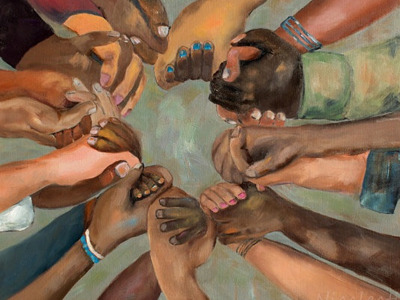
Mentorship & Coaching
Now, the malleability of the soul brings with it also a need to shape the next generation into the proper form; planting the seeds of a people that can achieve something better than the previous. When the Fe user has attained enough life experience, he will often take it upon himself to be the spokesperson of the truths he’s found; passing down knowledge to others. This is especially true when giving pragmatic advice for attaining success in one’s ambitions, which they may do by providing a list of dos and don’ts and offering moral guidance. Fe has a parental aspect to it and can often make a career as a life coach, pastor or preacher. And even when the Fe user is not a life coach by occupation, their role in their family or workplace will often be the same. However, tensions may evolve from this impulse as the Fe user may feel that they know best; a position which is not always shared by his peers. In the worst scenarios this can lead to unsolicited advice, nagging and patronizing. But in the best scenarios this can lead to the encouragement of others and the fortification of younger people towards their inevitable confrontations with the world.

Mind Over Body
Fe carries with it also a fire, a perseverance and a desire to overcome limitations. It believes in what we might call a force of will or an inner flame. The Fe user may believe that “anything is possible if you put your mind to it” and that you are the master of your own destiny. In a practical sense this often translates to activities such as working out through intense training or taking on a heavy responsibility. This becomes synonymous with a moral effort, where meeting the challenge of those extra 20 push-ups is not merely a logistical statement, but one that is tied to their sense of dignity and the fortitude of their mind. Thus for Fe it’s not simply about getting a six pack or the perfect body, but it’s about testing one’s strength of character – measuring how much resilience you have and how disciplined you are. It becomes about training your mind first of all to not be susceptible to the whims of the world, which it implicitly knows that it is. Fe understands that unless something is done, the world will shape you, your body’s weakness will decide for you, and your mind will fail to be your own unless it has been conditioned to resist adversity. It therefore uses training to gain the upper hand over the world and stay true to its values.

-Behaviors Under Stress
Shaming & Punishment
The Fe user’s love of coaching and preaching can turn into a habit of chastising and blaming when life becomes stressful and their generosity towards people has run dry. What once began as an effort to uplift and support now becomes an outlet for their frustration. If they’ve been subject to an unjust social economy, a bitterness may develop in the directive Fe user towards authorities, institutions and humanity at large. Rather than turn to themselves and seek a corrective attitude, the world is seen as responsible for their pain and they will levy moral condemnation at every opportunity. The Fe user become self-righteous, irritable and combustive. As this becomes a lasting attribute of their character, they may become emotionally abusive with their family members and loved ones. Put-downs become common place, every minor mistake becomes a gateway for moral judgment whether with disappointed glances, head shakes or critical words. The Fe function is keen to find faults in character and few can be so cutting in just the wrong manner as an Fe user well acquainted with the shortcomings of those who they’ve had years of exposure to. The Fe user may chase away all those close to them before finally turning inward to realize that the problem is not with the world but with their merciless perceptions and unjust expectations.

Self-Sacrifice
On the opposite side of the spectrum, when the Fe user is excessively adaptive, their tendency to feel responsible and obligated to tasks can become self-sacrificial to the point of martyrdom. Failure to perform and meet expectations can feel like a failure at the enterprise of life. Since for Fe the sense of self is dependent to a large degree on an individual’s performance and rapport within the collective, a poor rapport can more easily lead to a self-erasure due to a shame for existing. A tarnished career or blundered mission can lead the Fe user to feel the entirety of their worth has been nullified. The effects of this can range from a removal of oneself from a project, a situation or a relationship -- up to a removal from life itself. This act will be driven not simply by a desire to end their own suffering, but may be seen by them as a final act of nobility; a balancing of the social economy by setting right the wrongs represented by their existence. The stressed and adaptive Fe user may find it difficult to resist these thoughts and connect to their inherent value, outside of circumstantial accomplishments or failures.
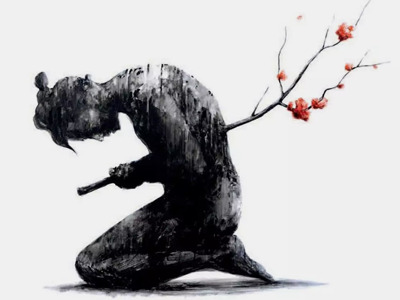
#Cognitive Typology#Cognitive Functions#Extroverted Feeling#Fe#ESFJ#ENFJ#Behaviorism#Teleology#Social Economy#Human Condition#Transmutable Soul#Tribalism#Collectivism#Mentorship#Coaching#Mind Over Body#Shaming#Punishment#Self-Sacrifice#Hero
6 notes
·
View notes
Text
The model we choose to use to understand something determines what we find.
Iain McGilchrist, The Master and His Emissary: The Divided Brain and the Making of the Western World.
#philosophy tumblr#philoblr#developmental psychology#philosopher#psychiatrist#iain mcgilchrist#ontology#phenomenology#teleology#dark academia#life quotes
15 notes
·
View notes
Photo
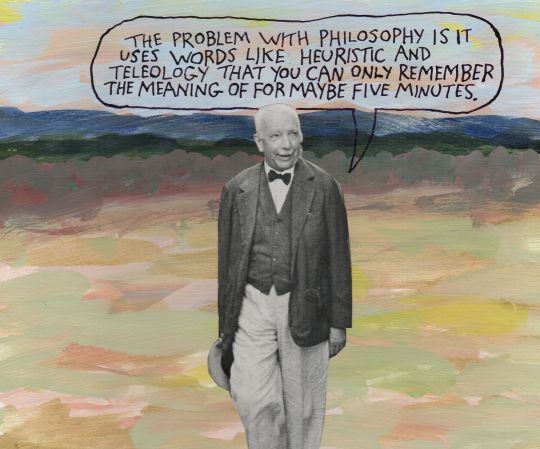
The problem with philosophy is it uses words like heuristic and teleology that you can only remember the meaning of for maybe five minutes. -- Michael Lipsey
96 notes
·
View notes
Text
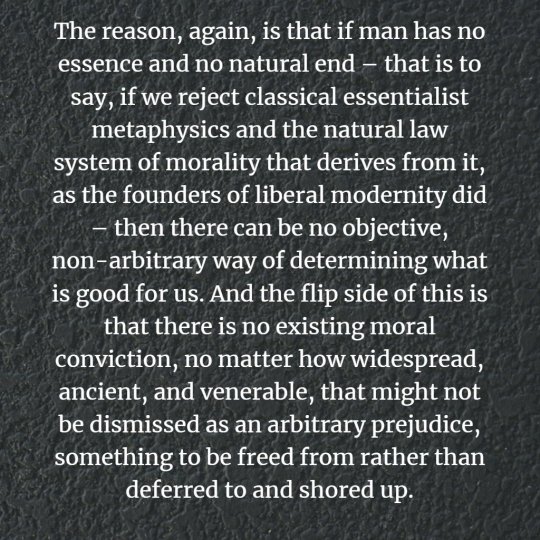
- Dr. Edward Feser
3 notes
·
View notes
Text
Identity and The Self: Performance vs. Genuineness of Self-Presentation
“Know thyself,” is an ancient Greek maxim inscribed on the forecourt of the Temple of Apollo. Its origination is of some debate, but scholars tend to trace it back to Thales and Chilon, the former of which is credited as the first natural scientist and analytical philosopher of ancient Greece, circa 620-540(ish) B.C. (Stokes, Philosophy: 100 Essential Thinkers)
But what do we mean by “thyself”? Granted, the phrase is generally more literally translated to “know thy measure,” but we’ll work with the common understanding of the phrase. “Thyself,” then, refers to the literal philosophical self. The essence of one’s being as a thinker and actor–as a force of will and character. Who are you? What makes you who you are? Is it nature or nurture? Genetics or environment? We all wonder these things as matters of pop psychology and philosophy. They’ve entered the common conversation. But what we don’t explore nearly as much is the methodology of achieving the goal of knowing thyself. We don’t have to learn thousands of years of philosophy and science to begin formulating a methodology, and the vast majority of people don’t know Socrates from Carl Rogers except on a vague timeline of centuries and geography–if that. But we all compulsively build a methodology for figuring ourselves out in order to function in society, and to build a moral structure with which we engage the world. But these methodologies vary in what they value highest. We think differently about what focuses we ought to have in order to figure out who we are, and even when we have the same focus, we accept different character traits as valuable in the narrowed path of that focus.
So let’s get down to it. We’ll start with that axiomatic aphorism: Know thyself. Our goal is to figure out who we are. So how do we do that? Well, that’s what we call a methodology, and it depends on what you carry as pinnacle values. What do you think is most important about the self and its will? As a quick introduction, I’ll refer to the Big Five (OCEAN) Personality Matrix. These are five spectrums of trait personality predilections often determined genetically (though weathered by social environment and neuroplasticity), and they include Openness, Conscientiousness, Extraversion, Agreeableness, and Neuroticism. To keep this brief, refer to the following graphic:

Maybe you’re a creative type and you value self-expression above work ethic or interpersonal responsibility. Maybe you’re an agreeable type and you value peace above absolute honesty. That isn’t to say you don’t value these other things, but that if the two are pitted against one another in a given scenario, one is much more likely to inform your behavior and response than the other. The proof is in the pudding, after all, and we often learn more about ourselves by observing our natural prerogatives in situations of stress–when we’re forced to be rapidly decisive–than in the fog of introspective self-assessment, where we’re free to build an understanding of ourselves upon speculation. These values determine how we’re likely to structure our methodology of “knowing thyself.” Before we can know that, we have to come up with some definition of what the self even is, so we know what it makes sense to value about it.
If you’re a creative type, you might view the self as whatever boils up to the surface out of your emotional behaviors and artistic endeavors. You may appreciate that the self is something of a mystery to you, and in so believing, you just allow it to be expressed however it primitively does. Or you might be the more structured creative type, and you value the craft more than the expression. In this case, you may value the work of self-analysis more than innate expression. While the earlier creative type might form a looser methodology of knowing thyself that focuses on the primitive dance of existence, this second creative type might form a structured methodology around thorough self-analysis and architectural construction of personal psychology. I personally believe I fall into the latter. I’m a creative type, certainly, as a writer and cartoon illustrator–a creator of worlds. But I am a bit of a slave to understanding the concrete structure of things, so that I can build form AND function. I rely on common understanding. I’m a pragmatic artist, I would say. The point of this being, these personality traits will come to inform what will be the focal landscape in constructing a path toward knowing thyself.
When you’re building that methodology, though, it isn’t just your a priori notions that inform its construction–and it isn’t genetics alone that deterministically concretize your personality traits from the beginning. We aren’t strictly a tabula rasa, of course, but thanks to neuroplasticity, nor are we psychologically fatalistic; though as we age our neurological pathways do calcify. It’s probably best to take a solid responsibility over these things as early as one can manage. As you’re constructing that methodology in your younger years, though, you want to identify what’s important to you. Then you want to understand that these priorities change over time, which makes it all kinds of fun to navigate, right? So what influences should we look at? This essay is going to focus on social pressures, though there are many more influences to consider. Social pressures, though, are the strongest–second perhaps to genetic predisposition, though there’s an argument about that among those who study and write the literature.
So what do I mean by social pressures? When I was conceiving of this essay, I was thinking about genuineness among those who subscribe to various spiritual beliefs and structures. For the sake of full disclosure, if you’ve read nothing else of what I’ve written, I consider myself a Christian Existentialist; that’s just a fancy term for someone who subscribes to Christianity, but values individual interpretation and discourse above traditional practices intended to create a ritual ideological community. I believe that the personal relationship to God is more authentic than seeking understanding through a spiritual leader–though both can work very well together if the parties have humility, compassion, and trust. But what I was thinking about was the level of natural genuineness that I perceived from different spiritual types. I determined that the most authentic people I knew were those of Judeo-Christian or Buddhistic spiritual leanings, and who followed these as matters of existential philosophy rather than sociopolitical identity. Some of the least authentic people I’ve known, after all, have also been Christians. I wondered what the common threads were. I came to an understanding that it had to do with what the person valued about the spiritual journey–what they thought its purpose was. In essence, it came down to teleology.
So what were these determining values? I think it’s explored more explicitly in what I’ve read of Buddhist philosophy, but it’s deeply overlooked as the implicit driving force of much of Christian philosophy and Scripture. It has to do with the individual’s place in life, or perhaps the individual’s purpose. I found that those who believed the individual’s purpose is to express oneself seem to come to this understanding superficially, and often hypocritically. This is a self-centered (literally translated) teleology. The purpose centers around the self imprinting itself in some manner upon the world. It’s ideological, at its core, because it has to do with the essence being willfully impressed upon its environment. That’s what creative expression is, after all. Conversely, I found that those who either didn’t claim to know that purpose, or those who claimed that purpose is a matter of identifying the truth in spite of oneself (or one’s unique expression), were more authentic in that they sought an understanding of their purpose in the whole of life rather than merely in what one can imprint upon it. When a person is concerned primarily with their impact as a validating activity, such as an ambitious businessman making a legacy for himself, they tend to build a methodology of knowing themselves which is centered around personality, reputation, and–most poignantly–identity. When a person is concerned primarily with the truth per se–(the truth apart from subjective interpretation)--which is a predilection so rare and unevangelized that it’s difficult to present an example apart from the practice of private philosophical and scientific study, they tend to build a methodology of knowing themselves which is centered around the axiom of truth as a sovereign state of reality. The truth is a thing apart from the self, which includes the self, and so what the self has of value is the effect it has upon its environment. The latter doesn’t seek validation, but rather genuineness itself. They can remove themselves from what validates the truth. The difference, it seems, is that those who seek to know thyself through identity are locked into a framework which requires their interpretation to validate reality, while those who seek to know thyself through truth per se wait for reality to present itself to them, and are careful to speak on its behalf. So there’s our dichotomy: Identity or Truth.
It’s no wonder that you’ll often find those who speak at length on the importance of self-expression and identity also tend to believe in the notion of “individual truths,” and they avoid or become contentious and combative at the idea of any objective or pragmatic truth. Anything which may threaten to invalidate the sense of identity is analogous to an oppressor of the self, because the framework within which they operate and the methodology for knowing thyself that they employ is centered around the pinnacle of identity construction above all other values–including the force of nature (often presented through the fallible lens of science, to be fair). To be transparent, this isn’t just an implicit consideration of transgenderism, though I do consider it in that regard, as well. This has more to do with the construction of persona and how it has come to be the prime philosophical and social activity of humanity’s teens and young adults, and how this is destructive to their ability to engage with reality–and their own minds–genuinely and with integrity.
Modern society and culture have a fetish with identity, and while I support properly regulated Capitalism as a pragmatic system above others we’ve developed, I do place much of the blame for this identity fetish on the prevalence and ubiquity of consumerism–in equal measure with social hierarchies among school children and teens, though the two are parasitically related. Identity has become the idol of modern social philosophy, and consumerism is its clergy. Who are you? What do (read: “should”) you possess to present that to the world? Are you disagreeable and creative? Maybe you’re a punk; buy this jacket. Are you a tortured armchair philosopher? If you’re conservative about it, read Dostoevsky at our tavern; if you’re liberal, read Sartre at our café. Are you an educated Republican? Make sure everyone knows by subscribing to the Daily Wire and sharing YouTube videos of Ben Shapiro “DESTROYING” some feminist humanities professor from Berkeley. Are you a fed-up Progressive? Post Facebook graphics from The Other 98% and share trending Tweets from Alexandra Ocasio-Cortez. Voice your outrage on our social media platform and wait for the engagement to spike. Get your likes, your retweets, your shares, your heart reacts–and if you’re lucky, maybe even some angry reacts and half-witted dissent diatribes that you can focus on shredding in your Twitter thread: tweet 15 of 45. And after you’ve spent your entire day in this noxious cesspool of finite superficial proxy conflict, lay down and suffer the insomnia when you’ve finally stepped away long enough to notice the effect it’s had on your psychology–your pupils shaking, your body irradiated and whirring with brain chemicals. Consumerism, after all, isn’t just products. It’s also services, and social media is a product AND a service. It gives you a global platform for modulating and regulating your identity at absolutely any given moment, and now “knowing thyself” is an act of consumerist self-expression. Gen-X complained about it as a serious counter-culture movement, and the brilliant beast of consumerism packaged it and resold it to their children, who couldn’t help it because they needed what their friends had in order to engage in the social atmosphere at school. They needed to stay plugged into the cultural zeitgeist to share in the conversation. They needed to share in the conversation so they could share opinions, and those opinions needed to coincide with the group to which the kid wanted to belong. They identified a position on the social hierarchy, and followed the steps laid out before them to gain access and status within that position. The social hierarchy replaced the parents as the formative structure, and that social hierarchy carried over into adulthood via the university, now that people are institutionalized by the education system well into their twenties. They’re kept within the safe structure of a microcosmic social society, and so they aren’t kicked out of the safety nest until they’re well into adulthood–and then they’re bitter that the world isn’t structured similarly, and they have no idea how to navigate it, and all the messages and lessons they received while amassing an insurmountable debt of student loans has little pragmatic utility in answering the question of who they are and what they should be doing, which is what their brains secretly think they’re in school for–not the training for occupational placement. In fact, it’s a known resentment among college-educated students that any facet of their identity or purpose is to play a role in society–to be any kind of structured citizen in a larger system. This resentment is a problem when you figure that the student is paying $50-$100k in lifetime debt just to figure out what they want to do with their lives, only coming to the understanding that it better not come with societal expectations or obscure laboring. It must be more meaningful than that–it must be lobbying or activism or building narratives. That’s what we’ve come to learn is purposeful in a society that devalues menial labor and resents the structure of society as an oppressive force.
So what does all that have to do with “knowing thyself”? It goes back to that fetish for identity. Focusing on modulating identity as the purpose of existence and the validation of the self leaves a person with no practical relation to their environment. They focus so much on philosophy that they neglect the necessity of skill and action. The bottom line is that it's performative. It’s about building a persona–a character. Francis Bacon said:
"The wit and mind of man, if it work upon the matter, worketh according to the stuff, and is limited thereby; but if it work upon itself, as the spider worketh his web, then it is endless, and bringeth forth indeed cobwebs of learning, admirable for the fineness of thread and work, but of no substance or profit."
If you spend all of your time insularly managing only your own intellect and the art of its method, your task is endless; it may be a craft that yields a construct of some beauty and uniqueness, but it has no practical application. One cannot live by identity alone. But if you give due regard to objective reality–the environment and its immutable forces upon you–then you are limited by its context, and you’re able–by those limitations–to navigate meaning and purpose more clearly and practically. Essentially, you won’t find yourself [as] lost in the chaos of existential crisis, because you place your self within the context of the self’s environment rather than concerning yourself entirely with how you can affect that environment–or, worse, how you can mold that environment through power to yield to the influence of your persona. Your persona, after all, is a fabrication, and nothing founded upon a fabrication will find itself more objective than its source. The persona is that character you built up to get what you want out of your relationships. It’s the version of you which is socially acceptable to the groups with which you’ve aligned yourself. What lies beneath that are all those latent things you fear of yourself, which exist as the shadow seeking to have a say in how it lives. We ignore it at our peril, and it returns in mysterious ways, as complexes and insecurities and trauma responses. The persona is the usurping superego of social progress, trying to force your subconscious to believe what the zeitgeist bills as social norms and progressive rhetoric. Maybe it’s right and maybe it's wrong, but the ability to genuinely know the difference doesn’t come from giving the persona power over the conscience–and people who do this can’t tell the difference between persona and conscience, indoctrination and understanding. Personally, I resent whatever degree of persona I feel I have to construct in order to relate to the world. The inauthenticity of it causes me intense dysphoria, and I’ve never trusted those who rely on it as a technical tool for achievement. People seek patterned and result-based structures of behavior, and a well-crafted persona does give results if the focus is some conception of material or social success–but not of philosophical “success,” by which I mean genuine understanding of being. That’s the thing we all seek, truly, but the task is often too great for those who, by necessity, must direct their efforts toward fully engaging pragmatically with their environment so that they can manage an acceptable lifestyle for themselves and/or their children. This may seem ironic or perhaps hypocritical, given my above criticism of insular self-assessment against practical understanding and action, but the point I mean to get at is that there is a necessary balance to be struck between honest, diligent self-analysis and practical application of personal philosophy. The ancient Greek philosophers of note believed that ethical being is to a large degree the ability to authentically explore the self, to understand it genuinely, and then to unapologetically embody that understanding through action; let your words become action. I believe this is what it means to know thyself. It comes down, again, to genuineness and authenticity in spite of the pressure to build a persona and modulate identity.
What are the dangers of centering identity? What trouble comes from focusing on modulating and regulating identity? Many proponents of the pinnacle value of identity would likely argue that modulating and regulating identity IS the process of knowing thyself. I’d argue, rather, that it’s the process of constructing a self, not knowing the self over which the identity is veneered. I would state as an axiom that the self is the conscience. It’s the voice of you that pushes itself through in spite of all that work against it and attempt to influence it. Those things which do attempt to influence and mold the conscience, I would say, are the forces of environment which make the persona seem necessary. They are the things which justify the concept of an identity which is reached through performative expression rather than the reasoned practice of a pragmatic philosophy. Such an identity is ingenuine. It is constructed to deceive in order to achieve. An identity reached by way of performative expression, such as presentation through wardrobe or music or superficial attitude, are techniques of manipulation. Ironically, they are an apologetic expression of a person. This is the version of you consolidated into an image or an icon, pieced together with heuristic symbolism that inevitably skews the complexity of the genuine whole. It IS pragmatic to that degree, though. It does allow you to offer an approximation of your personality to those around you, and that’s useful. But it bears the danger of becoming a self-fulfilling prophecy, in which you embody the persona so dependently that you become fearful of what exists beneath it because that self has been deemed, even by you, to be unacceptable. But that self never goes away–it only festers in the brig of your psyche, manifesting itself as a fog of anxiety, distress, and despair. This is the danger of centering identity in your methodology toward knowing thyself. You will never know thyself with identity as your focus. Identity is symbolic, synthetic, and insufficient. It is only pseudo-representative of the self, and so it is not the self, but a mirage of it. Something of you exists in it, but only as a modulated, synthesized version of you constructed from what the world can offer you in terms of products and services and ideologies that condense and amplify that self into a distorted doppelganger that can walk through the world receiving the interactions defined by your desire rather than the relationship of your self to the unadulterated reality within which it exists.
And so we’re left with the other side of this dichotomy: the truth. Another term quite difficult to define. Its definition is often contextual, and so it’s always necessary to define it in the context within which it is being used. Those who hold identity as the pinnacle value of social relations are often the sort to speak, as I mentioned, of “individual truths” or “personal truths” as if there is no objective reality within which the individual operates–from which the individual was brought into being. As you can imagine, those who disagree with the notion of individual or personal truth believe this to be an absurd proposition. Often these two types talk past each other, though. It seems to me that the apparent truth is that both are facets of reality. There are individual truths, which are defined by honesty and experience, and these are couched within the larger objective reality, within which those truths are bound to operate. For instance, a reasonable personal truth may be that one emotionally perceives their father to be cruel, while another emotionally perceives him to be strict but fair. The individuals in question genuinely react as though they believe these distinct judgments, and so neither is necessarily false–context is important. But if one of these individuals claims that their father is a pterodactyl who speaks to ancient Greek gods, it is the prerogative of the reasonable outsider to question the objective possibility of this claim. Maybe one could still claim that this is a personal “truth,” but that doesn’t mean it isn’t simultaneously a completely impractical delusion. It only functions within the framework of a fictional scenario. It might make a poignant children’s story, but it’s still couched within a fictional interpretation of reality, and there’s still an understanding behind it that the man is not, as a matter of empirical fact, a pterodactyl who speaks to ancient Greek gods.
So what do I mean by truth in the context of this essay? Truth, as I use it here, means the truth-in-itself, or truth per se. It means objective reality, apart from (or perhaps in spite of) observational interpretation. There’s some state of reality which exists beyond our perception of it, and in order to know thyself, one must understand that the self is bound by that objective reality. That objective reality may very well include God, but it includes anything which is the case of how reality exists in itself. Perhaps that means God created the universe, but perhaps it means the universe is self-propagating and meaningless. I tend to subscribe to the former for reasons far beyond the scope and bandwidth of this essay, but I make that point to clarify my definition of truth for the purposes of this essay. So if one centers this concept of truth as the pinnacle value within their methodology of knowing thyself, they remove the self from the foundation of the enterprise and place it as an empty box with a question mark in the sum field of the enterprise. If you imagine the process of knowing thyself as a linear ladder intended to take you from the uninformed bottom to the answer at the top, the identity-centered method places the self as a subjectively constructed thing at the ground-level from which we build up our relation to reality (and this defines truth), whereas the truth-centered method takes that self from the bottom rung, strips it of its fabricated dressings and symbols, and places it as a void at the top of the ladder to be defined in the process of climbing the ladder. The other rungs present themselves tangibly and practically as genetic predispositions and environmental influences such as the political and spiritual leanings of friends and family, pressures of self-preservation, demands of employers to fit company culture, and countless others. All those external factors are taken into account, as well as personal desires and the innate motivations of the conscience. This allows for the other, but the other often derides the factoring of any objective reality or empirically derived interpretation of reality, because it has the power to empirically invalidate the propositions of a self-constructed identity.
For these reasons, I’ve found that those who center the concept of an objective truth as the focus of their methodology for coming to know thyself are more authentic–more genuine–in their relations and presentation. Those who center the concept of identity (a sacred self-modulated social construct) as the focus of their methodology for coming to know thyself tend to seem guarded, performative, and often socially anxious. They have come to view the self as a blank slate to be wholly defined by their nebulous, ever-changing but irreproachable conception of whatever they believe they are at any given time. They see this complexity (or convolution) as a testament to the beauty of self-expression on the one hand, or as a practical technique of flexibility, cosmopolitanism, and social prowess toward the goal of personal achievement on the other. And that isn’t to say that some don’t see it as both. But neither of these views takes the self as something concrete enough to discover. Rather, it is an emergent property of necessity in the process of building an identity that serves a purpose centered upon desire. Understanding this, it seems to me no mystery that these types engage reality in the manner they do, and why they carry themselves in these ways which seem either genuine or uncannily fabricated.
Having addressed now the major points of the essay, I also mentioned that my initial question on this centered around how these different types engage with spirituality. The reason I centered on this initially was because I was trying to figure out what sort of philosophy could form the foundation of a genuine exploration of my own Christianity. I’d long been disenchanted by the church alone, but remained intimately convicted of the faith as a true myth, and so I understood that self-identification alone does not a Christian make. This is made devastatingly clear throughout the Old and New Testaments. Many of the troubles of the Jews and Christians were brought upon them by their own vices and poor character, and so the Bible itself is no apologist for its own people. Anyone who has read the God of the Talmud or the impassioned critical letters of Paul to his fellow Christians knows this well. And so it’s never been a matter of claims, but of the nurturing of the spirit toward genuine understanding, in spite of oneself. Faith, it seems, is a matter of a properly oriented philosophy of the self, not of symbolic terms of identity and acts of religiosity. I needed to know what this philosophy looked like, and I had no problem seeking wisdom beyond the Bible, which is why I’ve often found Buddhism to be a more genuine–or at least a more accessible–guide for beginning to understand the self and its relationship to the environment within which it exists and which gave rise to it. Christianity does this better, I believe, but through much less accessible and more [deceivingly] complex narratives. The point being, I’ve found that how a person seeks to know thyself determines the genuineness of their relation to whatever spirituality they subscribe to, and the two most genuine institutions of spirituality, which I would argue are Buddhism and Judaism/Christianity/Islam, seem to yield the most authentic and practical followers when their individual personal philosophies are aligned toward pragmatic engagement with reality. Others I’ve known–particularly those of the modern nebulous paganism–seem to engage with spirituality as a performative manner of self-expression rather than any practical guide toward understanding anything beyond identity. As a result, they have often come across to me as actors at play rather than philosophers at thought. A marked and mysterious few come to engage with religious conviction honestly and with the prerequisite inquisitive, humble, and practical wariness that earns them true sagacity of faith, while the masses only wield it by utility--whether it be their dogma or their devil.
My goal with this essay has been to explore and explain an observation, and to work through it by way of reason. I mean to reveal the core of these methods of defining self, and to briefly illustrate how each comes to create the sort of people who subscribe to them. The connection I believe I’ve made implicitly I will now make explicit:
Genuineness of self-expression is founded in the valuing of truth above identity.
From this understanding, I believe that we can observe the character of others more clearly, and work toward avoiding the mistake of relying on synthetic identity to tell us who we are and how we should engage with the world. It takes a fortitude of will to abandon the persona even to this degree, but I do believe that we all do genuinely desire to be our authentic selves. That said, though, I think our methods for achieving such a state of being differ widely, and are often built upon misguided principles and social values. Identity offers you nothing of substance–it is a thing of style; it emerges from substance as a simplified iteration of the self, having been filtered through countless external influences. Therefore, while it has social utility and deserves a level of understanding and respect, it is not the substance of the self. The self is not constructed out of will alone; it is whittled over time by an environment digging away at a core lump of clay. The self is weathered by the will of its environment, into rather than from an identity.
The self is an essence, and identity is a product. How representative the identity is of the self is determined by which you place at the foundation of your method for understanding who you are. If you place the product as the foundation, you create a feedback loop that disallows engagement with the essence that gave rise to it. To break that loop, center the truth, and from that view the self as something to be first discovered, then understood, and then defined by will. You cannot fake it ‘til you make it. You must find it before you can define it, and only then will you feel the peace of mind to engage with it meaningfully and change it willfully by way of understanding.
#philosophy#self#psychology#identity#persona#character#genuineness#society#social pressure#performance#truth#teleology#meaning#purpose#self-analysis#presentation#spirituality#Christianity#Buddhism#Judaism#self-expression#expression
2 notes
·
View notes
Text
youtube
TODAY IN PHILOSOPHY OF HISTORY
Immanuel Kant and the Hope for Cosmological Progress
Monday 22 April 2024 is the tricentennial of the birth of Immanuel Kant (22 April 1724 to 12 February 1804), who was born three hundred years ago today in Königsberg, now Kaliningrad, on this day in 1724.
Kant is counted among the greatest of philosophers, and his legacy is both large and complicated. Reconstructing his philosophy of history we find elements of providentialism, progressivism, and naturalism, all unified by Kant’s Enlightenment outlook. These several parallel influences in Kant’s thought yields a distinctive conception of historical progress in which human beings are a means to a cosmological end.
Quora: https://philosophyofhistory.quora.com/
Discord: https://discord.gg/r3dudQvGxD
Links: https://jnnielsen.carrd.co/
Newsletter: http://eepurl.com/dMh0_-/
Text post: https://geopolicraticus.substack.com/p/immanuel-kant-and-the-hope-for-cosmological
Video: https://youtu.be/4Th1b2Hp8SQ
Podcast: https://podcasters.spotify.com/pod/show/nick-nielsen94/episodes/Immanuel-Kant-and-the-Hope-for-Cosmological-Progress-e2in3pb
1 note
·
View note
Text
Music, Memory, and the Song of Life (dialogue with Karen Wong)
Karen Wong invited me on The Meaning Code again to discuss ideas we both find enriching. Below I’ll share a near transcript of the more interesting bits, including discussion of Michael Levin’s work:
Mike Levin frequently quotes William James, who defines intelligence as the ability to accomplish the same goal by different means. This definition emphasizes flexibility and adaptability to novel…
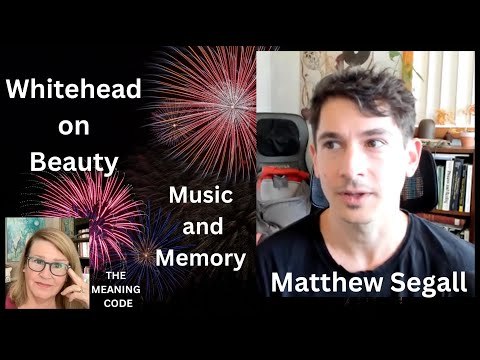
View On WordPress
1 note
·
View note
Quote
Atheism lacks any hopeful rationale for answers when it comes to questions about suffering and evil in the world. Thus, individuals often become overwhelmed by these issues rather than finding comfort or solace in the teleology (purpose) of evil.
C. Michael Patton
0 notes